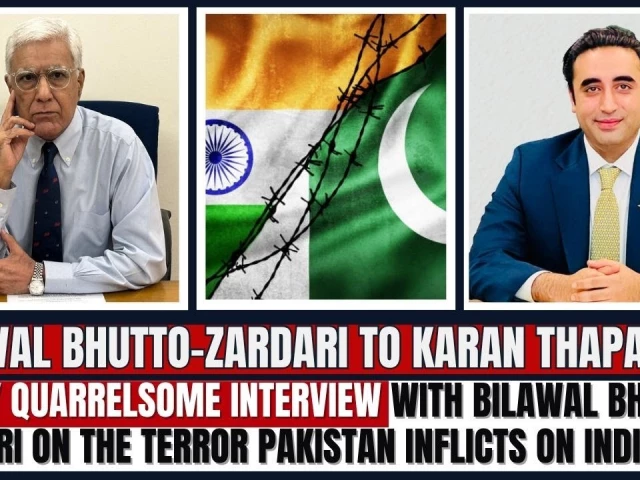Bilawal urges Indian youth to reject hate, war rhetoric
PPP chief refutes India's claims of Pak involvement in terrorism

Pakistan Peoples Party (PPP) Chairman Bilawal Bhutto Zardari on Wednesday urged the people of India to avoid falling prey to "disinformation and hate-mongering", stressing that it was easy for the current generation to talk about war.
In an interview with Indian journalist Karan Thapar, the former Pakistan foreign minister categorically rejected India's claims of the country's involvement in any acts of terrorism, terming such allegations a mere propaganda.
"I just want to tell the people of India that they must be, they must avoid disinformation and hate mongerers. It is easy for this generation to talk about war and tell you that every Pakistani is a terrorist, every Pakistani is your enemy; that is not true," he said.
"Pakistan does not willingly permit groups you mentioned or any group to conduct terrorist attacks outside of Pakistan but also within Pakistan. We have, as you're well aware, faced the brunt of terrorism over the past many decades. Pakistan is and has been fighting the largest inland war against terrorism."
While dilating on the issue of terrorism within the country, the PPP chairman recalled the immense toll the people have suffered. "We've lost 92,000 lives altogether. Just last year, we lost more than 1,200 civilian lives in over 200 different terrorist attacks."
The PPP chief warned that the current rate at which terrorist attacks were taking place in different parts of the country in this year, "if they continue at this pace, it will be the bloodiest year in Pakistan's history".
Bilawal acknowledged the emotional cost of the terrorism, saying, "I, too, am a victim of terrorism. I feel the pain of the victims of Pahalgam terrorist attack. I understand the trauma that their families are experiencing in a way more than many others can ever imagine."
About Pakistan's efforts to combat terrorism, he noted the military actions taken in South Waziristan and later in North Waziristan over the years. "Most recently, we went through a rigorous FATF process with the international community endorsing Pakistan's actions against said terrorist groups," he stated. Bilawal emphasised that the Financial Action Task Force was a very rigorous process that had a complete monitoring mechanism. "So it's not like you can hide from it," he said, adding: "We implemented a National Action Plan as far as our actions against the groups of concern to India."
Bilawal reiterated Pakistan's offer for an international probe into the Pahalgam attack in the Indian Illegally Occupied Jammu and Kashmir (IIOJK), in which 26 tourists were killed on April 22. The incident also triggered a four-day military escalation with Pakistan from May 7-10.
"Immediately after that accusation by the Indian government, the prime minister of Pakistan publicly stated that Pakistan is willing to be part of any impartial international inquiry into the incident because our hands are clean." However, he added, India rejected the offer.
He stressed the need for cooperation between Pakistan and India on counter-terrorism, stating, "I'd like to see the day where India and Pakistan engage in comprehensive dialogue, which should also include the issue of terrorism, so we can collectively combat this menace."
The PPP chairman recalled the 2007 Samjhota Express attack, where dozens of Pakistani citizens lost their lives on the Indian soil, questioning why there had been no convictions. "We can't ignore saffron terror on one side and then hold another standard by which Pakistan is judged," he said.
Highlighting the role of India in fostering terrorism in Pakistan, he referred to the case of Kulbhushan Jadhav, an Indian spy arrested in Balochistan. "Most recently, the Jaffar Express attack can be directly linked to facilitators in your intelligence agency," he told the interviewer.
Bilawal also raised concerns over India's plans to cut water supplies to Pakistan, calling Delhi's decision to hold the Indus Water Treaty into abeyance as a violation of humanitarian principles.
"Indian Prime Minister and your government are threatening to cut off the water supply to 240 million people of Pakistan. This goes against everything it is to be Indian. It goes against the philosophy of Gandhi. It goes against all we've been taught about a secular India."
Bilawal, who last month led a parliamentary delegation to several world capitals on a mission to debunk the Indian propaganda in the aftermath of the recent conflict, said that Operation Bunyanum Marsoos was launched in response to the Indian aggression.
Despite these challenges, he reiterated Pakistan's desire for peace. "We want peace. We can talk together and sort out all our issues," he concluded.
This was the first interview of a Pakistani politician by any Indian media outlet. In a tweet on X, Bilawal explained that he believed in the people of India, especially the youth and he was not afraid of putting "our case to the Indian public" via Indian media.
"I chose to give an interview to Indian media, not because I expected a fair platform, but because I believe in the people of India, especially the youth. The case for peace in our region is not just a Pakistani cause, it is a shared mission for both our peoples. I believe the new generation of Indians and Pakistanis can chart a new destiny," he wrote.
"We will be the generation that breaks the shackles of history, that defies the war-mongers, the cynics, and the peddlers of hate. Together, we will face the real challenges of our time together, from terrorism to climate change to inequality. This is my promise to the young people of both India and Pakistan: our future will be defined not by the conflicts of the past, but by a new destiny defined by peaceful co-existence, cooperation and prosperity."




















COMMENTS
Comments are moderated and generally will be posted if they are on-topic and not abusive.
For more information, please see our Comments FAQ